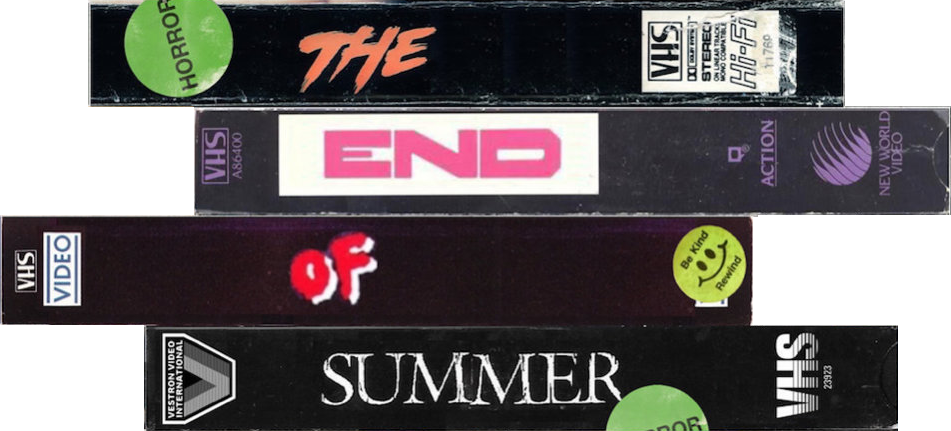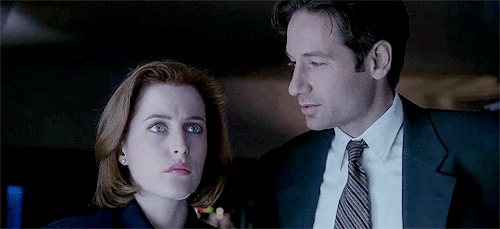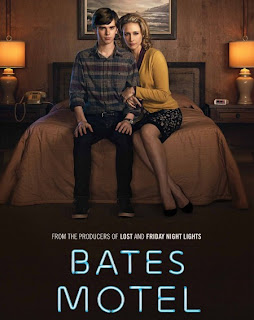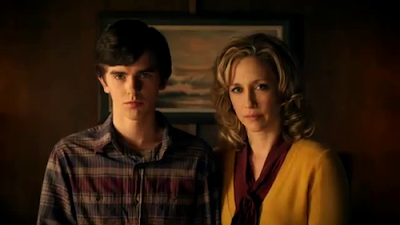
I’m a ‘90s kid. I think a lot of
us Internet dwellers are. It was during this magical decade where three
gigantic pop-culture phenomena TV shows came into
prominence; they entertained and captivated audiences, forever contributing strange references and expressions to the lexicon: Seinfeld gave us “master of our domain,” Friends offered “how you doin’?” and The X-Files, well...the one-hour paranormal drama gave us much,
much more. It gave us intrigue, mystery, horror, humor, icky monsters,
complicated love, and most importantly, it resurrected one of the biggest life
lessons which flourished during the cinematic movement of the 1970s: trust no one.
For nine seasons and two feature
films, Special Agents Fox Mulder (David Duchovny) and Dana Scully (Gillian Anderson) hunted the things that bumped in the dark, kept watching the skies, and slowly
fell in love. And during this mostly '90s-set series, I literally grew up watching it all unfold. It was the first "grown up" show I followed
with any regularity, and during my formative years, the impact of it all was
that much greater. My boyhood peaked during the show's best seasons, and when the
realization set in that said boyhood was nearly over and "grown up" things
were soon coming, it just so happened to coincide with the series losing its luster.
The magic was vanishing both in real life and the land of make believe.
It made coming of age a little bit harder, and in a way, made having to say
goodbye to the show something to dread, not anticipate with the usual amount of
excitement.

1998's feature film The X-Files: Fight The Future was meant to be the first of many theatrical endeavors that were planned to transition the series from the small screen to the big, with the show's fifth season originally meant to be its TV series swan song—a move that would allow time to
flesh out the alien mythology in a streamlined story while reaping the benefits
of fans anticipating seeing Mulder and Scully reunite in their never-ending
quest to find the truth, which, for all intents and purposes, was out there.
(Somewhere.)
This didn't happen.
Fox wasn't about to let go of its
largest viewership, even if they could have easily collected their X-revenue
from the box office instead of TV advertisers, so The X-Files remained on the air far longer than it should have. It
stayed on the air for so long that Duchovny (one of the leads) excused himself
from the show’s stranglehold during the last couple seasons in an effort to do
something—anything—different. This caused several complications, on top of ones
previously caused by a show having already satisfied its main conflict several
seasons ago. Obviously, a new new conflict would be needed, and in Duchovny’s
absence, new characters, which are almost always a sign of a creatively
bankrupt show.
After its disappointing finale in
2002, The X-Files, it appeared, had
been permanently sealed.

Enter the series' second feature
film I Want to Believe six years
later, which picked up on our beloved agents in the next stages of their lives:
Dr. Dana Scully was now a staff physician at a children’s hospital, and Fox
Mulder was now an unemployed and bored as hell recluse treating his home office
ceiling like a dartboard. Not nearly as bad as many fans claim it is, nor as
good as some well-meaning but misguided articles might have you believe (how
you doin’, AV Club?), The X-Files: I Want to Believe resurrected our
beloved FBI agents in a way that felt more perfunctory than ceremonial,
leapfrogging off a series finale that found them on the run and pursued by the
FBI, but lazily neutralizing that conflict by stating, basically, “Good thing the FBI stopped trying to kill us!” The series finale saw attempts on
their lives; their first appearances in I
Want to Believe found them barely hiding out, with Mulder lazing around his house protected by a single gate, and Scully working as a prominent doctor
under her real name, neither of them at all concerned about having a needle
shoved into their medullae oblongatae by a man in black.
Still, The X-Files was back—in theaters!—so if their so-called wantedness
by the FBI was the creative hurdle to overcome in order for that to happen,
fine. And I Want to Believe presented what ultimately would have been an
above-average adventure for our duo…had it been pared down and relegated to the
small screen. But with it being a feature film, anticipation for something
large in scale and teeming with aliens was expected, though not received, so the
reception was not great and its box office haul was pitiful. (Note to Fox, who chose to
open it one week after The Dark Knight:
counter-programming doesn't work against the geek demographic.)

Ordinarily, I Want to Believe would have signaled the end of the franchise. A
low-budget sequel produced to test the waters resulted in a resounding “no
thanks” from fans, not helped by its marketing campaign which opted to eschew
indication of its actual plot and instead drape its trailer in ambiguity that,
hopefully, would be surmounted by the return of Mulder and Scully. Fox was
banking on audiences saying, “They’re back? I’m in.” And it didn’t work.
Eight years later, and well into the
trend of resurrecting established properties for the small screen, the The X-Files returned with mostly
pitiful results. While it was an absolute delight to see Fox Mulder and Dana
Scully once again calling each other by their surnames, checking in via cell
phone, and doing that cool FBI thing where they point flashlights and guns as they charge into dark rooms, unfortunately, Seasons 10 and 11
made the same mistakes as its most immediate predecessor seasons.
To determine the worth of these
new episodes, we need look no further than the book-ending episodes of each new season, "My
Struggle" Parts 1 through 4.
With the first episode, the
introduction of Mulder and Scully felt perfunctory. The first scene with A.D.
Skinner (Mitch Pileggi) felt obligatory. Nothing about it felt big. And every moment should
have been big. It was The X-Files back
on television after fifteen years, people! Tepid second feature film aside,
this was a big deal and should have been treated as such. But Duchovny looked
bored, appearing as if he’d shown up late on set for the first day of filming
without time to slip back into his character (including his wardrobe). Anderson
still seemed to be in the process of shedding the cold disassociation with
reality her Bedelia Du Maurier had exhibited during her run on the short-lived Hannibal. Neither of them seemed
comfortable revisiting their most famous characters—not to mention the
arduously stupid dialogue with which series creator Chris Carter had saddled them.

The opening episode is in such a
hurry that it hits the ground running but doesn't know what to do when it
lands. There's so much to do, and so little time in which to do it—not just in
the 45 minutes of an episode, but in the six episodes of the new season. (What
first sounded like a good idea—the six-episode thing—became a handicap. Two
mythology episodes and four standalones that found subtle ways to move that
mythology along, or reintroduce us to these characters and allow us to see how
they've grown and changed, all sounded well and good, but so much it felt like
"hurry up and wait" that the wind was taken out of its proverbial
sails.) Thematically, where “My Struggle” failed the hardest was in Mulder’s
complete willingness to shed his philosophy about the alien invasion that had
served as his personal crusade for the entire run of the show, finding him too
eager to believe it was all just a distraction from the "real" truth. Fans
crucified the episode for this—"My Mulder would never sell out like
that"—and they were right to do so.
As to why Carter would introduce
such a revelation, there are two possible explanations. One: it was a graceless fumble to
concoct yet another alien mythology to order to give The X-Files its purpose, this being the third alien conflict for
our duo to investigate. Or two—and one that I’m more inclined to believe, given
the endless developments that support it: this was his attempt to attract a whole
new audience previously unfamiliar with The
X-Files by saying, “What, that? Those previous nine seasons? Forget all
that, don’t worry. All you need to know is: Mulder’s got a hard-on for alien
conspiracies, Scully’s along for the ride, and they once had an alien
baby." And the reasons to support this theory go on, from a statement on
the pre-Season 11 greenlight potential for more episodes from Fox entertainment
president David Madden where he referred to it as "Season 2” instead, to
the befuddling announcement that a series of prequel books geared toward
"young adults" are being written to explore Mulder and Scully in
their teens—before they joined the FBI or even knew each other.

As for "My Struggle: Part
II," Carter borrowed from another of his Fox television series, Millennium, by relying on a
conspiratorial group of shadowy men attempting to mass produce a biological
contagion as a means to decimate the world's population while leaving a
"chosen" few behind. Likely shot following Part 1, Duchovny again
looked awkward in the role, and Carter's dialogue—"There's talk all over
the Internet!"—again sounded corny and unrealistic. However, not all was
lost, and the episode was a remarkable improvement over Part 1. Anderson
exhibited a better ease at finding Scully again after so many years, and this
episode rode mostly on her shoulders. Carter, who pulled double duty as writer
and director, managed to show some directorial flare that bordered on damn near
cinematic (speed-ramping fight scenes notwithstanding). Devotees of the series
might have felt a rush at certain moments—the returning Monica Reyes' (Annabeth Gish) phone call to
Scully, for instance, or, finally, a significant amount of screen time for
C.G.B. Spender (William B. Davis)—but they weren't enough to sail this episode, and by proxy the
season, through to the finish line.
As for Season 11's mythology-"concluding" episodes, Chris Carter seems to have pursued a purposely dialed-down resolution to the Mulder vs. Cancer Man conflict, which became an organic backbone of the series throughout its run. After being hilariously and stupidly destroyed by a tomahawk missile fired directly into his face following the first ending to The X-Files waaay back in Season 9, Spender not only survived with some minor dents to the fender but he's still as dastardly as ever. But instead of the big, flashy, Hollywood ending Carter tried the first time, now, things for Spender ended with a whimper...and with a single gunshot. He survived a missile to the brain, but Mulder's gun finally does the trick, I guess, castrating this bigger than life conflict between them, relegating Spender to a simple monster of the week, as if he had never been hugely significant to Mulder's ongoing struggles with who he is and the real truth he's seeking.
Speaking of monsters, the new series' "monster of the
week" episodes all did admirable jobs of trying to find that careful
balance between satisfying the old fans, intriguing the new ones, and
presenting episodes that appealed to the many diverse sensibilities of its
audience. Different fans of old-school X-Files
loved the different approaches to the episodes: the horrific, the silly, the
pensive and quiet, and the mythological—all in equal measures. In order to give
every faction their due, and within the confines of a six-episode season, they
did as well as they could have. The problem, however, wasn’t the tone, but the
actual writing. If nothing else, Season 10 has the dubious honor of unleashing
upon its fanbase probably one of the worst—if not the worst—episode of the
show’s existence. (Do I even have to say “Babylon”? Couldn’t you all have
assumed that?)
Line-dancing! Gangsta rings!
Cameos from dead dorks! What is happening!

Amidst all of these
disappointments, one stood head and shoulders above the rest. It wasn't the
lackadaisical performances, the questionable story choices, and the wildly
uneven tone. It's that with Season 10, The
X-Files lost its intelligence. It sacrificed subtlety to satisfy how
apparently angry with and saddened by his country Chris Carter has grown. What
made the original run of The X-Files
so thrilling and beloved was how American it was. And I don't mean Reagan's
America, but the real America—history book America. The original series was
socially relevant and mindfully political because it pertained to a certain
bygone era of America's modern history, off which the show created a lot of
mystique. The most political it ever got was by insinuating that J. Edgar
Hoover had once been part of the conspiracies that ran rampant—and by
implication, President Nixon, easily roping in that tangible sense of paranoia.
This specificity to an era of American history is always going to be relevant
because that aspect is so ingrained in/with American culture. It's vital to our
culture in the same way baseball is our national pastime. There's no explaining
why—it just is. This is what gives The X-Files
strength and purpose: the paranoia of the blue-collar nobody attempting to
circumvent the trials and tribulations of everyday life in order to find the
truth. Is there a conspiracy? If so, who's in on it? Who can you trust? How
high does it go? Equal parts The
Manchurian Candidate, All the
President's Men, and The Day the
Earth Stood Still, The X-Files
endeavored to embody that same spirit—American stories about American conflicts
featuring American men and women standing up against invading threats. They
were about us fighting corruption at the very top.
Carter's new X-Files was no longer interested in subtlety. Far more interested
in broad strokes and empty meaningless gestures about how we can improve as a
people (talking and love can fight terrorism! homelessness is bad; someone should
do something!), the new X-Files
didn’t skewer American culture as much as focus on the things that have
hindered that culture. It's Carter's insistence on making the series socially
relevant that forced it to stand out like a sore thumb when compared to
everything that’s come before. With the introduction of right-wing TV host Tad
O'Malley, Islamic extremism, and references to drones, constant surveillance,
the Iraq War, anthrax, and Edward Snowden, it's tried so hard to feel current
that it somehow already felt dated by the end of the episode. One day there
will come a time when religious extremism and ISIS and suicide bombings become
a thing that just was. Down the road, new fans will discover the show, and
these new episodes, and think, "Was this ever part of your culture?"
But the original conflicts that really gave The X-Files its power—Watergate, the JFK assassination,
Roswell—aren't just pages of our history, but shapers of our culture. They're
never going to dissipate, and they exemplify what Fox Mulder is trying to do:
expose the shadowy government officials at the highest levels for what they are
and prove to the American people they've been lied to.

Even if we want to take a step
back from all the pseudo-philosophizing and examine the show for nothing more
than a piece of entertainment, the rebirth still existed on shaky ground.
Carter wasn’t able to overcome the recognition that The X-Files achieved pop-culture status. Even people who never
watched a single episode in their lives know the names Mulder and Scully. They
know "trust no one." And they know, without ever having seen a frame,
that Mulder and Scully totally wanted to do it to each other. Carter was so
aware of this pop-culture status that he seemed unable to refrain from elbowing
his audience in the side, in every episode, to remind them of this. Too aware
of its own legacy to just be a show, it tried to be a show at the same time it
was reminding people, "Hey, this was a show before it was a show!"
Scenes of Mulder being confused by iPhones are played for laughs, oddly
suggesting that following I Want to
Believe, he lived in a closet while culture continued to advance without
him. The "mini" versions of our characters that appear in
"Babylon"—down to Lauren Ambrose's red hair and her ultra-cynicism—have
all the subtlety of a fireworks factory exploding. And the list goes on and on.
Different intellectual properties
have been explored on television in various ways, whether they be the
resurrection of previous series or film properties being explored in inventive
reboots. But none of them ever felt the need to remind their audiences, "Hey,
we've done this already." It caused The
X-Files' return to feel obligatory, exhibiting a seeming "Oh, is it
our turn?" mentality. As if they didn’t really want to be back.
And that sucks.
Though Seasons 10 and 11 seem to
be the final word on The X-Files in
terms of television (and Anderson, who has been enjoying one celebrated role
after another since then, has made it very clear she wouldn’t do another
season), Carter has been claiming for years that he's written a film script for
The X-Files 3, and his comments on
that script suggest the events of these new seasons don't really complicate
what he's already concocted. The problem is he already had a long break between
Season 9 and I Want to Believe, and then another long break between that and
Season 10, to focus on the story he wanted to tell and how he wanted to tell
it. Hence why Season 11 didn't dare much better.
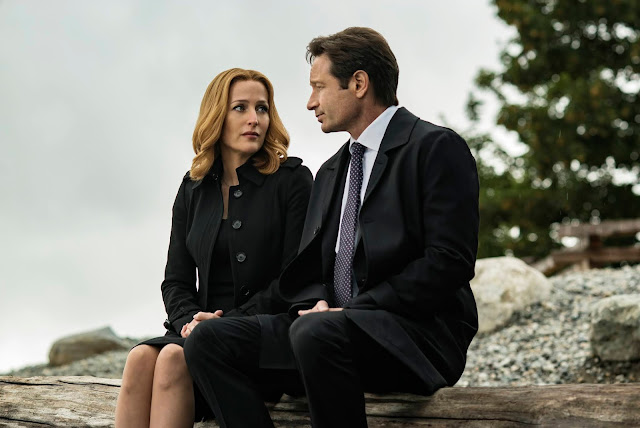
If Chris Carter loves The X-Files as much as I believe he
does, the best thing he can do for it is close the lid of his laptop and hand
over all future writing responsibilities to someone else – either to the staff
he’s assembled over the years which includes Breaking Bad creator Vince Gilligan, or to the dreaded ‘new class’
of writers who could take that concept of The
X-Files and re-create it as something new while giving it a clean slate.
Regardless of what form in which
it returns, The X-Files could be
great again. After seeing how low it can go, any eventual returns would have to
serve as some kind of marginal improvement. Or maybe that's the fan boy in me
holding out hope that such a thing is possible. Maybe, at this stage, after so
many disappointing seasons, it's simply not possible.
But, let's just say I want to
believe it is.
